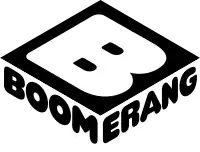Boomerang (Latin American TV channel)
Boomerang is a 24-hour cable television channel owned by AT&T's WarnerMedia under its International division. A localization of the original United States channel, it launched in 2001 and primarily carried classic Warner Bros. and Hanna-Barbera cartoons up until 2006, when it relaunched as a youth-oriented service. The network would relaunch once more in 2008, now focusing exclusively on teenagers, before becoming the first Boomerang feed in the world to undergo the 2014-15 worldwide rebrand on 28 September 2014.
 | |
| Network | Cartoon Network |
|---|---|
| Headquarters | Atlanta, Georgia, United States |
| Programming | |
| Language(s) | Spanish Portuguese (Brazilian feed only) English (SAP only) |
| Picture format | 1080i HDTV (rescaled to 16:9 480i/576i for standard definition feeds) |
| Ownership | |
| Owner | WarnerMedia International (AT&T) |
| Sister channels | Cartoon Network Tooncast |
| History | |
| Launched | 1993 (block) 2 July 2001 (channel) |
| Links | |
| Website | www |
| Availability | |
| Cable | |
| Cablemás Juarez Chihuahua México | Channel 411 (Cablemás Digital) |
| Flow Trinidad | Channel 35 (Trinidad feed) |
| Satellite | |
| Dish Mexico | Channel 308 |
| Sky | Channel 323 |
| DirecTV | Channel 334 |
History
2001–06
The channel was launched on 2 July 2001 with the same graphics and programming from the US variant of the channel. It used to air classic Hanna-Barbera cartoons that had been dropped from the Latin American variant of Cartoon Network back then.
As general children's service (2006–07)
On 3 April 2006, Boomerang was relaunched as a general children's entertainment network, introducing a logo and on-air branding style identical to that of Pogo (a Turner-owned kids channel in India). Classic cartoons were pushed to the overnight and early morning hours, while the daytime lineup began to feature live-action and animated series; this also encompassed a variation of the Tiny TV block, Mini TV.
As teen-oriented channel (2008–14)
In January 2008, (June 2008 in Latin America) in the Brazilian and Mexican localised feeds,[1] the channel modified its logo and reluanched again, now solely broadcasting original and third-party-produced shows aimed at teenagers. All classical animation was moved over to Tooncast, a separate 24-hour channel which launched in December of that year. The channel aired some successful blocks, such as Boombox, which consisted of interviews to different artists and featuring live concerts in Latin America, the US and later, the United Kingdom. On 1 April 2009, the channel launched a mobile service.[2] Outside of Latin America, the channel is an associate member of the Caribbean Cable Cooperative.[3] By mid-2010, the channel's logo was slightly modified.[4] By May 2011, it was the only Boomerang channel in the world that didn't air any animated content. On 1 April 2014, cartoon programming returned to the daytime schedule. It was later confirmed that the channel would be part of the worldwide rebrand which would take place later that year.[5]
See also
External links
References
- "Boomerang extingue os clássicos de seu sinal latino só agora?". ANMTV (in Portuguese). May 30, 2008.
- http://www.realtvnews.com.ar/new/noticias.php?id=4400
- Member channels of the Caribbean Cable Cooperative Archived 16 August 2011 at the Wayback Machine
- http://boomerangla.com
- http://news.turner.com/article_display.cfm?article_id=6623